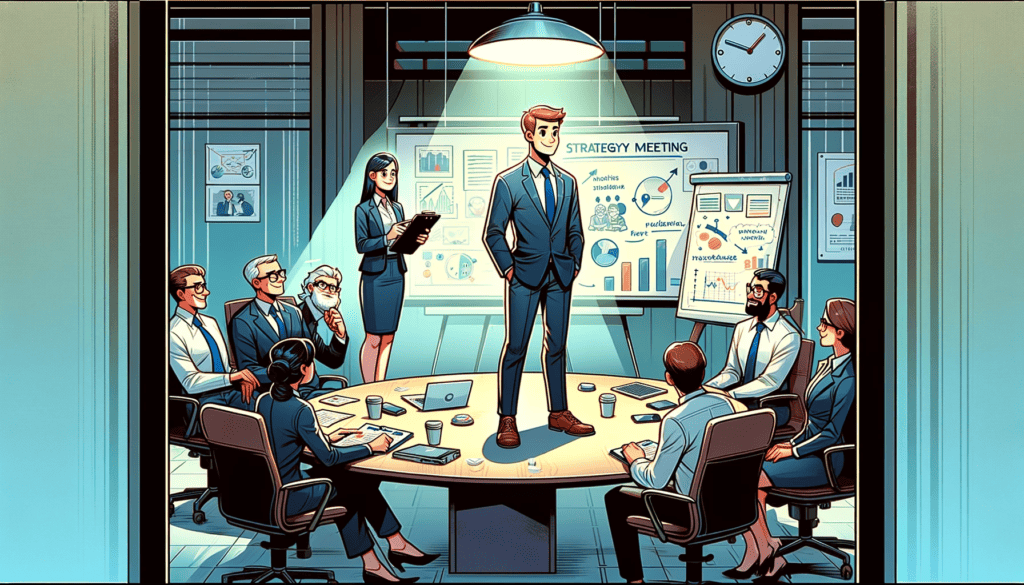Last Updated on December 26, 2023 by Daniel Boyce
When your boss makes you feel incompetent, it can be a significant blow to your professional confidence and personal well-being.
This situation, where a superior consistently undermines your abilities, not only affects your self-esteem but also creates a tense and unproductive work environment.

Tackling this challenge requires tact and a well-thought-out strategy. In this concise guide, we explore seven effective steps to help you regain your confidence and assert your competence.
These strategies are crucial for maintaining a positive professional trajectory and personal peace of mind, empowering you to navigate through and beyond this difficult dynamic in the workplace.
Key Takeaways
- Feeling competent at work is tied to overall life satisfaction, but critical bosses can undermine this.
- Employees often remain silent about negative work conditions due to fear of repercussions.
- There are actionable strategies to cope with and mitigate feeling undervalued by one’s boss.
9 Strategies for When Your Boss Makes You Feel Incompetent
In the upcoming sections, we will explore a range of strategies to effectively manage and respond to situations where you might feel your boss is threatened by you or is exhibiting challenging behavior.
Let’s briefly outline the key areas we will delve into:
- Identifying the Underlying Issues: Understanding the root causes of your supervisor’s behavior.
- Addressing the Matter Directly: Proactively handling conflicts with strategic planning.
- Requesting a Private Discussion with Your Supervisor: Tactfully initiating a private conversation to address workplace issues.
- Fostering Regular Dialogue: Keeping consistent communication to build a better understanding and relationship.
- Consulting Trusted Colleagues: Gaining insights and support from your peers.
- Pursuing Skills Development: Enhancing your professional skills for personal growth.
- Highlighting Your Strengths: Emphasizing your successes and contributions.
- Filing a Formal Complaint: Taking formal action when necessary, with appropriate preparation.
- Maintaining Professionalism: Upholding professionalism in the face of challenging scenarios.
These strategies are designed to equip you with the tools necessary to navigate complex workplace dynamics and maintain a positive professional trajectory.
1. Identifying the Underlying Issues
Discerning why your supervisor might be exhibiting negative behavior towards you is essential.
This task involves a nuanced understanding of human behavior and workplace dynamics.
Consider if their conduct is influenced by external stressors, such as organizational changes or personal challenges, or if it reflects a personal bias against you.
It’s not just about identifying the problem but understanding the context behind it.
For example, if your supervisor is under immense pressure, their behavior might be unintentional and not personally directed at you.
Recognizing these nuances is fundamental to devising an effective response strategy.
It’s also helpful to observe if other colleagues are being treated similarly, which can provide further clues about the supervisor’s behavior.
2. Addressing the Matter Directly
Proactively resolving conflicts in the workplace requires strategic thinking and careful planning.
Instead of waiting for the situation to escalate, it’s advisable to identify the key issues and prepare a structured approach to address them.
This preparation involves listing specific incidents, reflecting on how they’ve affected you, and thinking about constructive solutions.
If you feel your contributions are undervalued, prepare to present examples of your work that demonstrate your value.
This proactive approach shows your commitment to resolving the issue and your professionalism in handling difficult situations.
3. Requesting a Private Discussion with Your Supervisor
Seeking a private conversation with your supervisor to discuss workplace issues is a step that requires tact and preparation.
The goal is to create a space where both parties feel comfortable expressing their views.
When requesting this meeting, it’s important to be clear about your intentions and to approach the conversation with specific goals in mind.

This might include seeking clarity on your performance, understanding your supervisor’s expectations, or expressing concerns about certain behaviors.
Involving Human Resources can provide an additional layer of formality and neutrality if needed. The key is to maintain a calm and professional demeanor throughout the conversation.
4. Fostering Regular Dialogue
Regular interactions with your supervisor are crucial for a healthy working relationship.
These meetings are opportunities to discuss your progress, address any concerns, and receive feedback.
Regular dialogue can prevent misunderstandings and help you understand your supervisor’s perspective better.
Additionally, these meetings can be used to showcase your achievements and contributions, thus creating a positive impression and possibly altering your supervisor’s perception of you.
The consistency of these meetings is key, as it helps in building trust and a more transparent working relationship.
5. Consulting Trusted Colleagues
Speaking with trusted colleagues can be a valuable source of support and insight.
When dealing with a challenging supervisor, the perspective of peers can be enlightening. They might offer different interpretations of your supervisor’s behavior or suggest alternative ways to address the situation.
Additionally, sharing your experiences can be cathartic and help alleviate stress.
However, it’s important to choose whom you confide in wisely, ensuring that your conversations remain confidential and professional.
This network of support can be instrumental in navigating complex workplace dynamics.
6. Pursuing Skills Development
Enhancing your skills through additional training is a proactive way to improve your professional standing and self-confidence.
This could involve enrolling in formal training programs, attending workshops, or even engaging in self-directed learning through online courses and reading.
You can use the Competency Index (CI) to help determine where you might need development the most.
Developing new skills not only makes you more competent in your role but also demonstrates to your supervisor and colleagues your commitment to professional growth.
This personal development can also provide a constructive focus, diverting your attention from negative interactions and bolstering your resilience in the workplace.
7. Highlighting Your Strengths
Focusing on your strengths and achievements can be a powerful antidote to negative treatment from a supervisor.
Compile a comprehensive list of your professional successes, skills, and positive feedback received from others.
This list serves as a tangible reminder of your value and contributions.
Use this information in discussions with your supervisor to reinforce your role and achievements.
Additionally, seeking feedback from peers and mentors can provide a broader perspective on your strengths and areas for improvement, which can be useful in these discussions.
8. Filing a Formal Complaint
If efforts to resolve the situation amicably fail, filing a formal complaint with Human Resources may be the next step.
This process should be approached with careful documentation of incidents, including dates, descriptions, and any witnesses.
This record is essential for substantiating your case and ensuring that the issue is addressed fairly and systematically.
Understand that this step can have significant repercussions, so it should be considered carefully and utilized when other strategies have been exhausted.
9. Maintaining Professionalism
Maintaining professionalism in the face of unfair treatment is challenging but essential.
This involves managing your emotions, responding thoughtfully to provocations, and continuing to perform your duties to the best of your ability.
This approach not only helps in preserving your professional reputation but also in safeguarding your mental well-being.
Being professional doesn’t mean accepting inappropriate behavior; it means handling difficult situations with grace and integrity.
This approach can also set a positive example for others in the workplace and potentially influence a change in your supervisor’s behavior.
5 Factors Contributing to Feelings of Incompetence at Work
The reasons why managers might unintentionally make their employees feel inadequate are complex and multifaceted.
70% of people have been negatively affected by workplace toxicity.
Awareness and understanding are crucial steps in addressing this issue to foster a more encouraging and productive work environment.

1. Toxic Workplace Dynamics
A toxic work environment significantly impacts employee self-perception and job satisfaction.
Factors like a lack of supportive teamwork, poor communication, and a culture that focuses on criticism rather than encouragement can be detrimental.
For instance, when employees don’t receive constructive feedback or feel isolated due to poor teamwork, they may start doubting their abilities and contributions.
This dynamic not only affects individual employees but can also lead to a widespread decrease in morale and productivity.
2. Underlying Insecurities of Leadership
Leaders who are grappling with their insecurities might unknowingly impose these feelings on their team.
This is often manifested through unrealistic expectations, excessive criticism, or taking undue credit for team accomplishments.
Such behaviors create an environment of constant scrutiny and doubt among employees.
For example, a manager who frequently dismisses innovative ideas or fails to acknowledge individual efforts might inadvertently foster a workplace where employees feel undervalued and question their own competence.
3. Preference-Based Discrimination
Favoritism in the workplace can be a significant demotivator.
When supervisors openly prefer certain employees, rewarding them disproportionately, it can create a sense of injustice and neglect among others.
This situation leads to lowered morale and a feeling of invisibility regarding one’s efforts and achievements.
The consequences of such discrimination are far-reaching, often resulting in decreased team cohesion and overall productivity.
4. Overbearing Supervision
Micromanagement is a common issue where a supervisor constantly oversees every detail of an employee’s work.
This level of supervision can be suffocating and may imply a lack of trust in the employee’s abilities.
For example, when a boss dictates every step of a task or insists on being involved in minor decisions, it can leave employees feeling undervalued and incapable of independent action, thus diminishing their confidence and creativity in their roles.
5. Restricted Autonomy
Autonomy is crucial for fostering engagement, innovation, and a sense of ownership among employees.
When a boss restricts this autonomy, it can convey a lack of trust in their employees’ judgment and capabilities.
This limitation not only stifles creativity but also leads to disengagement and a decline in morale.
For instance, when employees are not allowed to make decisions or are constantly overruled, they may begin to feel that their expertise and insights are undervalued, leading to feelings of incompetence and disconnection from their work.
Summary
Effectively managing workplace challenges, especially when dealing with a critical supervisor, requires a strategic and proactive approach.
Key steps include self-assessment of performance, documenting achievements, engaging in constructive dialogues with employers, utilizing professional development resources like AwareRecruiter.com, understanding company policies on employee treatment, building a supportive professional network, and maintaining assertiveness in the face of unfair treatment.

These strategies are essential for restoring confidence, maintaining professional dignity, and enhancing one’s position in the workplace.

Daniel Boyce, founder of AwareRecruiter.com, brings a diverse background in health, fitness, sales, and recruitment to career development. He’s passionate about helping professionals overcome workplace challenges and succeed in new roles. Daniel’s vision for AwareRecruiter.com is to create a comprehensive resource for career growth and satisfaction.